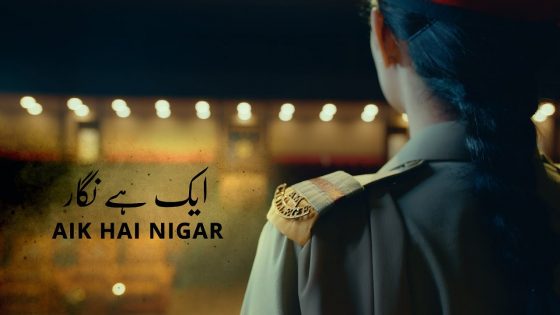Summary
The Inter Services Public Relations (ISPR) wing of the Pakistan Armed Forces has started playing an active role in the mass entertainment sector by getting involved in the production of television dramas, patriotic songs, film festivals and even reality shows. While the industry has welcomed this association, there is a real risk of the establishment exerting control over the narrative and influencing how people think.
On 14 August 2021, the first teaser of the telefilm Aik Hai Nigaar, based on the life of Pakistan’s first female three-star General, Lieutenant General Nigar Johar, was released, featuring the country’s biggest star, Mahira Khan, who also donned the producer’s hat. It is not unusual for producers to capitalise on the nationalist fervour surrounding the country’s Independence Day, but what was significant was that the Inter Services Public Relations (ISPR) wing was tagged on various social media posts and that the media division of the Pakistan Armed Forces chose to further reshare it, thus giving the project its stamp of approval though it is not credited as a producer or co-creator. What is further interesting is that the ISPR has in recent years become a very influential player in Pakistan’s entertainment industry.
This is highlighted by four recent developments. Controversy erupted in June 2021 when the teasers of Dhoop Ki Deewar were released, which featured a Hindu Indian hero and a Pakistani Muslim heroine who connect over mutual grief. Aired on Zee5, an Indian streaming platform, but produced and acted in by a Pakistani crew, there was outcry as people thought it was a cross-border, inter-religious love story pivoting around Kashmir. They were also against the idea of the hero not being Pakistani-Muslim. Very soon, the scriptwriter, Umera Ahmed, went to great lengths to clarify this was a “social tragedy” and that the story was sent to the ISPR for approval before being offered to over-the-top (OTT) platforms.
Earlier this year, the media wing launched a 26-episode military reality show titled 60 Hours to Glory, based on one of the toughest military competitions called the ‘Pakistan Army Team Spirit’, featuring eight local and four international teams. The ISPR, in its Instagram post, stated that it would “showcase the rigours of Pak Army’s training regime, portraying ‘Why We are the Best’.” The show was designed to “stimulate the entertainment industry to produce an innovative stream of thrilling and adventurous content.”
The ISPR also conceived and hosted the first National Amateur Short Film Festival in June 2021 to promote young talent “to produce high quality short films projecting [a] positive image of Pakistan”, which was attended by Prime Minister Imran Khan. It also green-lit another military-themed drama series, Sinf-e-Aahan (Women of Steel), featuring some of the top female actors from the Pakistani industry.
Over the years, the ISPR has produced or supported more than 60 patriotic songs, 20 documentaries and about 10 television serials and movies each. However, there has been heightened activity in the last two years with a focus on promoting a positive image of the country. This was emphasised a few years ago when the-then Director General of the ISPR, Major General Asif Ghafoor, spoke of the need for the media industry to create public awareness and highlighted its frontline role in 5th generation warfare.
The involvement of the army in Pakistan’s entertainment industry has evolved over the decades. During the dictatorship of General Zia-ul-Haq (1977-1988), severe censorship was imposed on the performing arts sector. Later, under President Pervez Musharraf (1999-2008), the sector was liberalised, resulting in the burgeoning of private television channels. Today, it is an active partner and co-creator of popular content.
Hence, unlike four decades ago when the industry stood up against dictatorial norms, it has now welcomed the establishment’s support, as both a facilitator and an enabler. It is eager to partner in such collaboration as this could help propel the growth of the sector. The Pakistani film and drama industry is currently going through tough times with cinemas mostly closed due to the COVID-19 pandemic; the OTT market being at a nascent stage and a consistent decline in expenditure on television advertising since 2018. While it is not clear if the ISPR makes monetary investments, it is known to provide logistical support. Nevertheless, the association offers heft to the projects, attracting big names from the industry and thus ensuring a certain degree of success.
It is not unusual for the entertainment industry to collaborate with defence sectors – Hollywood has a long-standing relationship with the US Department of Defense – as the benefits are mutual. While the former gets access to military material, the military establishment can exert control over the narrative, thus influencing society and the way people think. Hence, it was no surprise that Squadron Leader Abhinandan Varthaman, who was captured by the Pakistani army during the 2019 Balakot air strike, found a place in the 2019 ISPR drama series Eid-e-Wafa, or that the Kashmir cause is highlighted in its productions. Moreover, encouraging and inspiring the youth to witness military life could be another positive outcome.
However, on the flip side, in a highly fractured subcontinent where entertainment has been a great unifier, with people from both sides of the border enjoying each other’s content, there is a real risk of rising jingoism. Shaan Shahid, Pakistan’s popular cinema star who has headlined many military action films, tweeted a photo of himself in combat pose: “@OfficialDGISPR… we will always be protecting our cultural borders.. it’s time we expose the enemy’s plan to attack through the entertainment borders.”
. . . . .
Ms Nithya Subramanian is an Editor at the Institute of South Asian Studies (ISAS), an autonomous research institute at the National University of Singapore (NUS). She can be contacted at nithya@nus.edu.sg. The author bears full responsibility for the facts cited and opinions expressed in this paper.
-
 More From :
More From :
-
 Tags :
Tags :
-
 Download PDF
Download PDF


